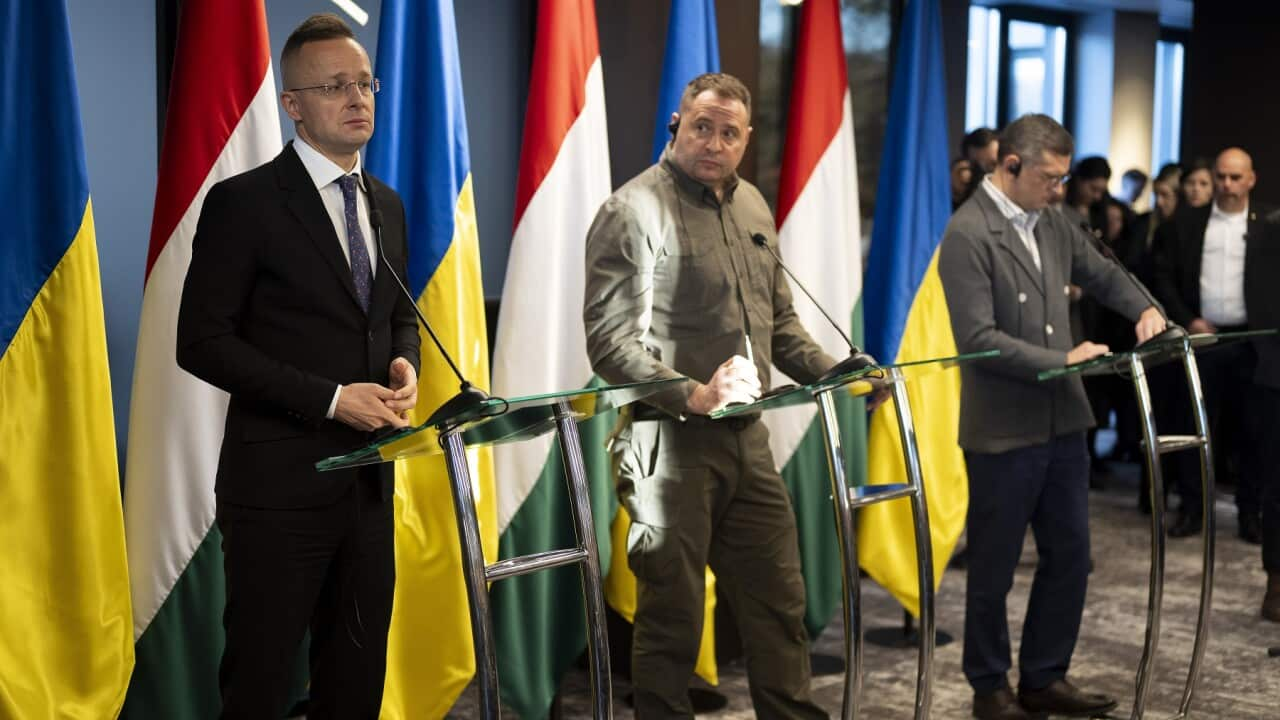TRANSCRIPT
That's the sound of diplomatic tensions easing, as Hungarian Foreign Minister Peter Szijjarto, met with his Ukrainian counterpart Dmytro Kuleba and Head of the Ukrainian President's Office, Andriy Yermak.
It was the Hungarian foreign minister's first visit to Ukraine since Russia's invasion in February 2022, and the only official bilateral meeting with his Ukrainian counterpart in the last two years.
Speaking afterwards, Mr Szijjarto said the talks, near the western Ukrainian city of Uzhhorod, had gone a long way to rebuilding trust.
“I think we agreed that we have made encouraging steps towards this. We still have a long way to go. We have a lot of work to do, but we on the Hungarian side are ready to do this work, so we are ready to continue working together.”
Mr Szijjarto praised the removal of laws last year which restricted ethnic Hungarians in western Ukraine from studying in their native language, a dispute that has dominated the countries' poor relations for years.
But he has called for the reinstatement of rights that existed under former Ukrainian President Viktor Yanukovych, whose ousting in Ukraine's 2014 Revolution led to Russia's annexation of Crimea in that year, the beginnings of the current conflict.
Crucially, the meeting did not lead to an outcome on Hungarian Prime Minister Viktor Orban's December 2023 veto against providing an E-U aid package worth $82 billion dollars [[50 billion euros]] Kyiv needs as it battles Russian forces.
Mr Yermak said he hoped the talks would lead to a meeting between Mr Orban, who on Monday expressed "openness" to withdrawing his veto, and Ukrainian President Volodymyr Zelenskyy.
“How we are today on both sides, it was quite clear that there is an interest in holding a meeting at the level of the Prime Minister of Hungary and the President of Ukraine. And I think we have taken a very powerful step towards this meeting today."
As the the second anniversary of Russia's February 2022 invasion of Ukraine approaches, continued financial support for Ukraine hangs in the balance, amid concern other global conflicts, including the war between Israel and Hamas.
Ukrainian advances into territory captured by Russia since then have slowed dramatically, with both militaries continuing to report the destruction of opposition targets in multiple directions along the front in the country's east this week.
Funding from the Biden administration, which so far has provided around $113 billion dollars ((US$75 billion dollars)) in humanitarian, financial and military assistance to Ukraine, has faced major setbacks, following Republican opposition to a package of $92 billion ((US$61 billion)) in new aid.
But U-S Secretary of Defence Lloyd Austin, returning to work after nearly a month's absence because of prostate cancer, says he is encouraged by developments for the NATO alliance, one of Ukraine's key partners.
"Over the nearly two years since Putin's unprovoked invasion of Ukraine. NATO has grown stronger and more united than ever. NATO became even more capable last year when Finland joined. And I'm very pleased that the Turkish parliament voted last week for Sweden to join NATO as well."
U-S officials including Secretary of State Antony Blinken are meeting with NATO officials in Washington to discuss the risk of global conflict, in particular escalating tensions in the Middle East.
NATO Secretary General Jens Stoltenberg has joined Mr Blinken in warning that a reversal of Ukraine's territorial gains against Russia is also a risk to global, not just regional, security.
"The war is now nearing the two-year, mark the situation. The situation on the battlefield is challenging. But NATO allies are, providing, unprecedented support to Ukraine. And it's important that we continue to do so. Our support to Ukraine is not charity. It is an investment in our own security. Because, the world will become more dangerous if President Putin wins."













